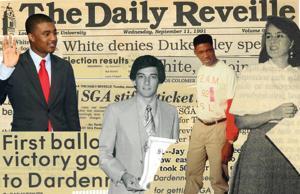
Shawn Wilson has been building bridges since his college days.
Wilson, former secretary of the Louisiana Department of Transportation and Development who’s now the sole Democrat in the race for governor, is campaigning on the same crossing-the-aisle theme he did when he ran for student body president of University of Louisiana at Lafayette in 1993.
“Our campaign was about a team: together everyone accomplishes more,” Wilson said of his college campaign. “We put together a ticket and we called it ‘Students for Students.’ We had an international student, we had a treasurer from the business college, we had our first openly gay candidate, I believe, at that time, on our ticket, and we were successful.”
Wilson is one of many former student leaders who have gone on to help run the state.
Popularly elected student governments, considered to be public bodies under the law, play an important though often overlooked role in shared governance of a university. These positions are often students’ first experiences with public service. Former student body presidents serve at every level of government in Louisiana, from parish police juries to the legislature to the state Supreme Court.
As the representative for the students at ULL, Wilson served on the University of Louisiana System Board of Trustees, where he met a young lawyer representing the board in a lawsuit: Preston Castille.
“He was a very good student member,” Castille recalled of Wilson’s service on the board.
These days, Preston Castille sits on the Board of Elementary and Secondary Education (BESE). In 1987, he was the student body president at Southern University in Baton Rouge and a student member on the Louisiana Board of Regents.
Castille came into the role much younger than most. He was just 19 and a sophomore when he was elected.
“The volume of information was at times overwhelming because it was all new to me,” Castille said. “But I learned so much about higher education, about how governmental bodies work, how the political process works within an organization because we had to work together collaboratively to get something done.”
Ten years earlier, Jay Dardenne made waves as LSU student government president.
Dardenne currently serves as Commissioner of Administration in Gov. John Bel Edwards’ cabinet and previously held elected office as lieutenant governor, secretary of state and state senator.
Dardenne was the last law student to serve as LSU’s student body president before the law school became a separate entity and set up its own student government. He was also the last student member on the LSU Board of Supervisors to not have a vote.
“I was a non-voting member of the LSU Board of Supervisors, which was fascinating but frustrating, because I could participate as a regular member. But when it came time to vote, I didn’t have the power to vote,” Dardenne said. “So that was my introduction to the legislature. I testified in the legislature on a bill that ultimately passed and gave the student members of the management boards the right to vote.”
Davante Lewis reveled in his right to vote as a student member to the University of Louisiana Board of Supervisors.
Lewis, freshly elected to the Public Service Commission, served as McNeese’s student body president from 2012 to 2014, serving on the UL System board for his final year as president.
Lewis was elected during a period of turmoil for higher education, as Gov. Bobby Jindal sought to slash state college and university budgets to reign in a self-induced budget problem.
“Jindal was part of the catalyst of why I ran because I was so kind of ticked off of the policy debate around higher education and saying, I don’t see my administration standing up for us, I don’t see the system standing up for us, I think it’s time the students stand up for us,” Lewis said.
When Lewis joined the UL Board of Supervisors in his second term in office, he said his advocacy led to several lectures from other board members who thought he should seek guidance from them before speaking out about policy and the governor.
“I took an antagonist role in governance to say that I am here to agitate you to do what’s best for students,” Lewis said.
Laurie White Adams was not one to shy away from a fight either.
Adams, now a Baton Rouge council member and candidate for a Baton Rouge-based state House seat, was student body president of LSU in 1991 when former Gov. Edwin Edwards was seeking a fourth term in a heated race against David Duke, a former Klu Klux Klan grand wizard.
Adams pulled the Student Government Association’s support for a Free Speech Alley event at which Duke was scheduled to appear after his campaign covered the campus in election signs that gave the impression the SGA was sponsoring a Duke rally.
In an interview with The Reveille, Duke accused Adams of disrespecting free speech.
“Long story short, a CNN producer calls the chancellor [to ask], ‘Do you not believe in free speech at LSU?’” Adams said. “Chancellor [Bud] Davis called me, and it was a pretty tense and intense day. But you know, we stood our ground.”
Mimeograph no more
By the time Davante Lewis ran for student office in 2012, social media had completely revolutionized the way student leaders ran for office, compared with the low-tech mimeograph campaign flyers Jay Dardenne handed out in Free Speech Alley.
But shoe leather and coalition building have remained the same, whether you’re a student government candidate in the 1970s or a gubernatorial candidate in 2023.
“We targeted populations like the fraternities, we targeted populations like residence halls,” Wilson said of his 1993 student campaign. “We targeted a base of people who, for various demographic reasons, aligned with our issues.”
Wilson said the same basic principles apply to his gubernatorial campaign.
“A university is a microcosm of a state,” Wilson added.
Lewis, fresh off a December runoff in which he unseated an incumbent Public Service Commissioner, said his experience campaigning for student body president as a non-fraternity member helped him in his underdog campaign for the PSC.
“I knew what it meant to build a campaign apparatus against the conventional wisdom of who votes and how they vote,” Lewis said.
Lewis said he used his student campaign playbook, building a coalition of smaller constituencies, such as the Chinese and Vietnamese student associations, to unseat 18-year incumbent Lambert Boissiere III. Instead of seeking 20 votes here and there from various groups, Lewis networked in small towns and overlooked communities in the PSC’s 3rd District.
Castille reflected on the way technology has changed between his 1987 student race and his 2019 BESE race, but pointed out how the principles are the same.
“I remember campaigning [for BESE] thinking, ‘This is like being in college all over again,’” Castille said. “The personal contact, developing a platform, meeting people. I enjoyed it as a student, and I enjoy it now as a BESE member.”
Getting schooled
Political leaders are just as prone to human error as the constituents they represent. One benefit to student governance is an opportunity to make those mistakes – and learn from them – in a lower-stakes training ground.
Wilson said he learned a lesson about the value of taxpayer money when, as one of his first acts as student body president, he decided to replace the furniture in his office, where he ended up spending very little time.
“When we got to the office of the [DOTD] secretary, I didn’t touch the walls one time,” Wilson said. “I don’t think I bought anything. I hit the ground running and one of the first things I told my staff is, ‘If I have to spend most of my time in the building, I’m not doing the job I need to do as secretary.’”
Lewis looks back on the times he said too much – or too little – that shape his approach to the Public Service Commission.
“So now as a [Public Service Commissioner] who kind of ran against the system, I’m utilizing those same lessons of, this is when you go public with something, this is when you work behind [the scenes], this is how you go to compromise,” Lewis said.
“I think student government produces so many leaders because you really find out what your leadership style is and who you want to be because the options are endless. But the potential for what you do changes the direction of your life,” he said.

Leave a Reply